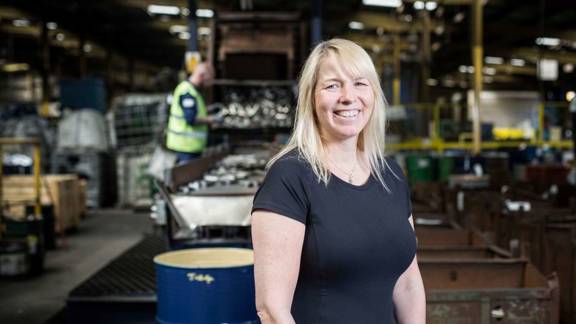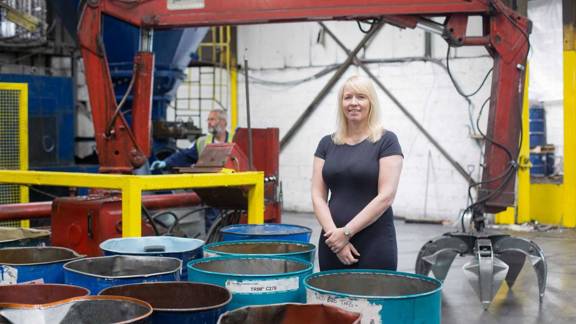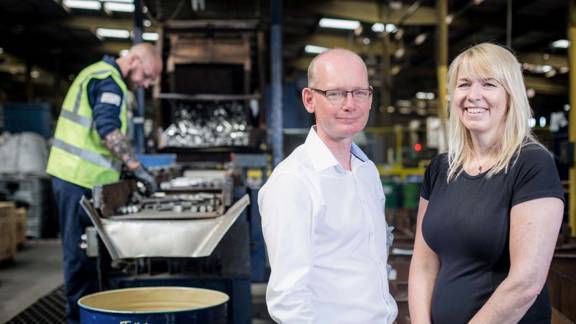How Ireland Alloys started exporting to China
Ireland Alloys is targeting growth in the Chinese market. "China is opening up business we didn't have before" says Rosie Hill, Business Development Manager.

30 Jul 2018 | 4 minute read
We caught up with Rosie Hill, Business Development Manager, to hear how Ireland Alloys is expanding their business into Asian markets. She shares her insights on the benefits of exporting to China and tips for success:
Why did you decide to start exporting?
"Our export market is very niche. There are only a finite number of customers for us in the world who have vacuum furnaces, so our business relies on exporting heavily – mainly to Europe and the US."

Rosie Hill, Business Development Manager, Ireland Alloys
Running a successful export business
"Ireland Alloys process complex alloy scrap. We buy high nickel and cobalt alloy scrap from around the world. We bring it back to Hamilton in Scotland, where it's sorted, valued, processed and analysed, then sold to superalloy manufacturers worldwide.
"We’ve been in Hamilton since 1964 and since then we’ve won the Queen’s Award for Innovation. We've managed revert (scrap) for the largest aero-engine manufacturers and have relationships with major superalloy mills globally to supply them with products."
Why did you choose China?
"China has always eluded Ireland Alloys. With demand slowing in most geographical areas in 2015-16 due to the demise of oil and gas, we didn’t want to risk lower volumes, so we decided to explore emerging and previously untapped markets. And with China’s economy still growing, albeit at a downgraded 6.5%, it seemed logical to try."
Who did you contact for advice?
"We were fortunate to already be account managed by Scottish Enterprise. They helped us look at our strategy and gave advice on getting started in China. This involved lots of research above anything else.
"So, we advertised for a Mandarin-speaking student to work part-time for us as a market researcher.
"Meanwhile, Scottish Enterprise’s High Growth Markets Unit invited us to attend their events on doing business in China and introduced us to the China-Britain Business Council."

What have been your biggest challenges and how have you overcome them?
"The biggest challenges in dealing with China have been the language barrier, cultural differences and finding the relevant contacts within businesses.
"We overcame this by bringing on Tina Liu, our student researcher, who has helped us research thoroughly – contacting and communicating with potential customers and suppliers. She has also organised business trips to meet these companies, which is essential in Chinese business culture."
What are the biggest benefits of exporting to China?
"Importing and exporting to China has opened up a huge established market for us, which should increase our turnover. We're de-risking the business by moving away from reliance on Western markets.
"China's such a huge country that they have huge demand there in our business sector. We're actually opening up business that we didn't have before.
"Since our business trip in October, we’ve secured two new suppliers and four or five potential new customers.
"Apart from moving the business forward, from a personal perspective exporting has broadened my experience of dealing with different cultures and doing business on a more personal level. It gets me travelling more."
Have you had to adapt your product or service for overseas markets?
"Yes, we have to adapt our service and product to each individual customer. When doing business with China, it just takes a little longer to get started. We’ve had to communicate on a more regular basis to build relationships and trust first."
What's your route to market?
"For customers we deal direct, and for suppliers we deal with traders. Our advice would be to do your research well and meet the people you'll be dealing with. We like to go direct as our market is niche and our product is certified by us. It also gives us greater control."

Rosie Hill and Brian Carolan from Ireland Alloys, with David Dickson working in the background.
Any advice for others thinking about exporting to China?
Rosie suggests businesses should:
- Get in touch with Scottish Enterprise's High Growth Markets Unit and the China-Britain Business Council
- Network and speak to people who have experience of business in China
- Research – it's so important, so do lots of it
- Get as much help and support as you can
- Employ someone who's capable of speaking directly with customers in market
Rosie adds, "The fact that we have a very good quality product helps us as well."
Scottish Enterprise support
Rosie says, "Without Scottish Enterprise's guidance, we wouldn’t have started in China yet.
"They've helped us get the resources required and given us focus and the confidence to move into the Chinese market."
Where's your company now in terms of exporting?
"We’ve just secured our first export to China to supply our first state-owned superalloy mill – their first purchase ever from a Western supplier.
"On the import side, we’ve also received our first two purchases from two new suppliers – traders worth in excess of £300,000.
"Turnover-wise, we're looking to take it from £1.1 million within the first six months right up to, potentially, £12 million after three years."
Rosie adds, “Do your research, speak to people who do business in China, and go for it.”
Next step
Get ready to export – create an export plan with our help.
-
Sign up to email updates
Stay up to date with the latest news, events and opportunities for your business.
